12 French cooking verbs
Feb 28, 2023Don’t make this mistake…It's not always CUIRE!
You love French, you love French food. And when you talk about cooking you look the word up and find CUIRE. What a great word to say!
However, it's so easy to think that this word covers all your cooking vocabulary. And unfortunately, it doesn’t.
While most people will understand what you’re saying, why not get a bit more accurate and enlarge your vocabulary to say what you really need to say in the kitchen?
So, in this mini-lesson, you will learn:
- Synonyms of CUIRE
- How to use these words in real situations
- How to remember them

How to say to cook in French.
First, the basic French word you have to know is cuisiner meaning to cook. Fortunately, it’s a regular verb with the following conjugation:
- je cuisine
- tu cuisines
- il / elle cuisine
- nous cuisinons
- vous cuisinez
- ils / elles cuisinent
Let’s have an example in a normal conversation:
- Tu aimes cuisiner ? >>> Do you like cooking?
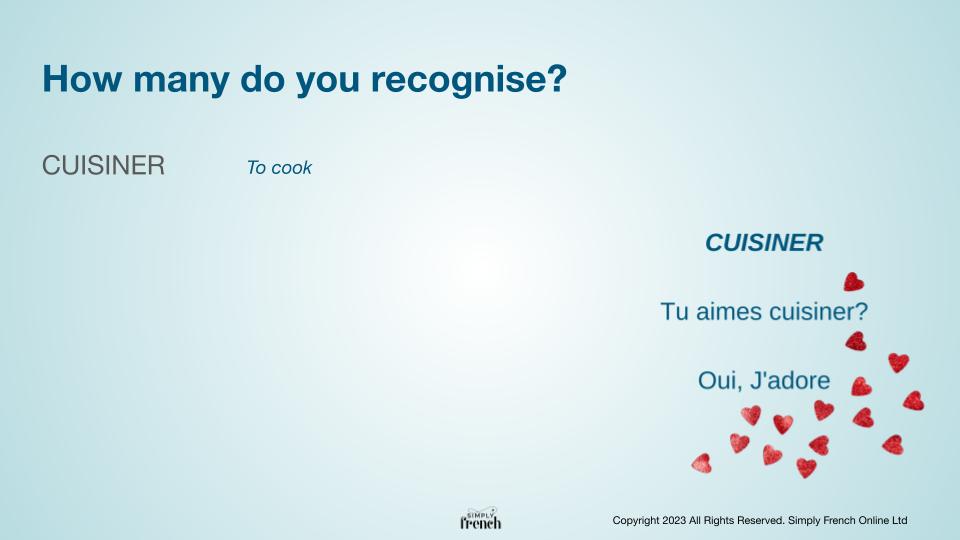
A French cooking verb similar to the English one.
Then, there’s this French word with the same spelling in English: préparer. Once more, it’s a regular verb:
- je prépare
- tu prépares
- il / elle prépare
- nous préparons
- vous préparez
- ils / elles préparent
In this context, you could say:
- Ce soir, on va préparer un bon repas ensemble. Ça marche ? >>> Tonight we are going to prepare a good meal together. Are you in?

One of the most useful French verbs.
This verb in French will always be handy because you can substitute it for many verbs. Indeed, the verb faire meaning to make/do is general. You don’t know how to say to cook? Say faire la cuisine. However, it’s a very irregular verb:
- je fais
- tu fais
- il / elle fait
- nous faisons
- vous faites
- ils / elles font
Here’s how you could have it in a sentence:
- Qu’est-ce qu’on fait pour nos invités demain soir ? >>> What are we going to do for our guests tomorrow night?
Let me share with you other expressions with the fabulous verb of faire.
- faire les devoirs >>> do homework
- faire les course >>> do shopping
- faire du vélo >>> bike ride
- faire le lit >>> make the bed
- faire le ménage >>> clean the house
- faire du sport >>> do sport
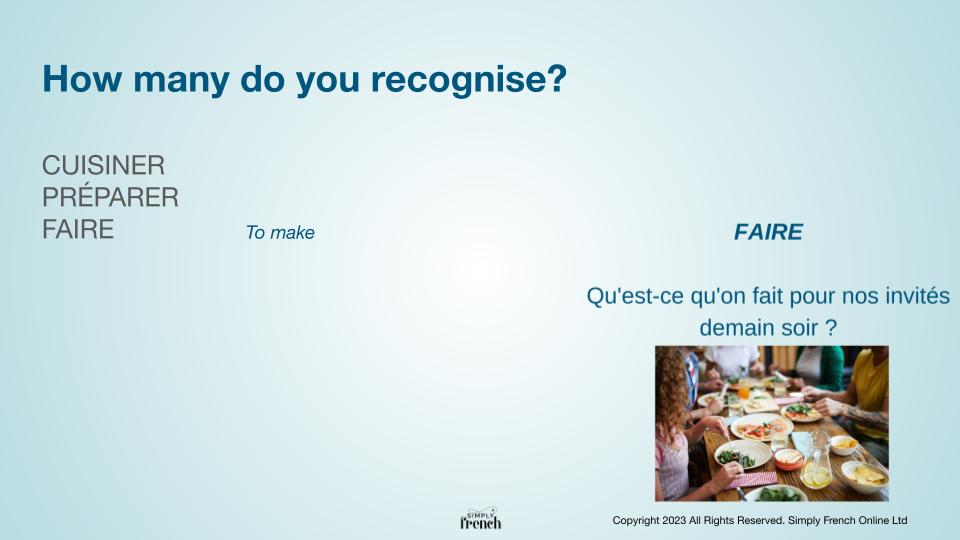
The French cooking verb involving water.
Are you preparing pasta? Are you making some tea? Well, in both cases, you need to boil some water. And the French verb for it is bouillir (boo/ee/yeer). Oui, it doesn’t look like a regular verb but it is! Have a look at the conjugation:
- je bouille
- tu bouilles
- il / elle bouille
- nous bouillons
- vous bouillez
- ils / elles bouillent
You could read something like this:
- bouillir l’eau pour les pâtes >>> boil water for the pasta.
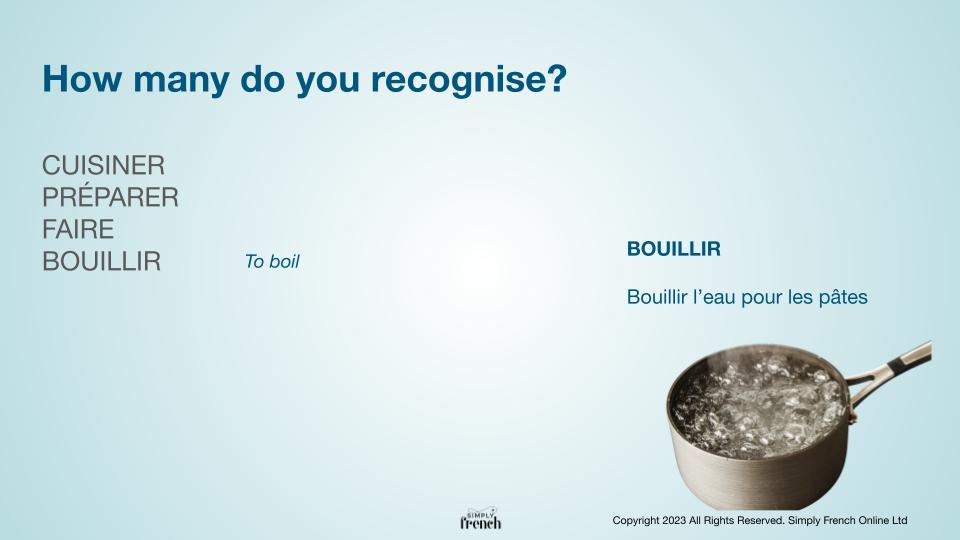
How do you say to fry in French?
There are so many things we fry. Therefore, you should know this useful verb in French: passer à la poêle. Literally, it means putting it into the frying pan. Easy! It’s regular:
- je passe
- tu passes
- il / elle passe
- nous passons
- vous passez
- ils / elles passent
How would you apply it in a conversation?
- Fais passer à la poêle jusqu’à que ce soit doré >>> Fry it in the pan until it’s brown.
Note that the poêle is commonly pronounced: “pwall”. And you could also employ the verb frire like this:
- je fris
- tu fris
- il / elle frit
- nous frions
- vous friez
- ils / elles frient

What’s the difference between chauffer and réchauffer?
At this point let’s focus on a verb and its derived one. First, should you want to heat a meal, your French verb is: chauffer. Now, if your prepared dish is cold and you desire to reheat it, you would opt for the same verb but with the prefix “re” or “ré” meaning once more / again. The result? It’s: réchauffer
- je réchauffe
- tu réchauffes
- il / elle réchauffe
- nous réchauffons
- vous réchauffez
- ils / elles réchauffent
This is what you could read or hear:
- On dit qu’il ne faut réchauffer la nourriture qu’un maximum de 2 fois. >>> It is said that we should reheat food only 2 times maximum.

A technical French cooking verb meaning to steam.
This French verb is pretty specific. You would find it in a recipe or on the menu of a restaurant. It means to steam. In French, we say étuver. Guess what? It’s a regular verb!
- j’étuve
- tu étuves
- il / elle étuve
- nous étuvons
- vous étuvez
- ils / elles étuvent
Let’s observe an example with a version of this verb:
- Les légumes cuits à l’étuvée sont meilleurs pour la santé. >>> Steamed vegetables are better for health.
Note that most French people wouldn’t use exactly the verb étuver but they would prefer: cuire à la vapeur. This means to cook with steam.
In case you need a reminder about the verb cuire:
- je cuis
- tu cuis
- il / elle cuit
- nous cuisons
- vous cuisez
- ils / elles cuisent

Do you know how to translate to roast in French?
French people love their ovens and prepare many delicious meals with them. It’s the basic tool in their kitchen. That’s why you should know the verb to roast in French: rôtir. It goes like this
- je rôtis
- tu rôtis
- il / elle rôtit
- nous rôtissons
- vous rôtissez
- ils / elles rôtissent
Let’s transform the verb into a noun:
- Pour faire un bon rôti, suivez attentivement les instructions >>> To prepare a good roast, follow carefully the instructions.

This French verb is related to pastries.
Are you fond of crèmes brûlées? Tartes brûlées? Bananas brûlées? The wonderful desserts share a common point: they are all flamed. In French, the verb is flamber.
- je flambe
- tu flambes
- il / elle flambe
- nous flambons
- vous flambez
- ils / elles flambent
You would say something like this:
- On dit que la meilleure crème brûlée est flambée >>> It is said that the best crème brûlée is flamed.

The French cooking verb for to burn.
What if you don’t master the art of cooking and you burn something? You need this French verb and it is brûler. Still with luck since it’s regular:
- je brûle
- tu brûles
- il / elle brûle
- nous brûlons
- vous brûlez
- ils / elles brûlent
Here’s a real example for you:
- Mince ! J’ai brûlé les petits pains ! Ils sont vraiment trop cuits >>> Damn! I’ve burned the rolls! They are really overcooked.

The familiar verb - to burn.
With the same idea but in another register, let’s learn how to say burn in a more familiar way: cramer.
- je crame
- tu crames
- il / elle crame
- nous cramons
- vous cramez
- ils / elles crament
A funny illustration for you:
- Chéri - tu as vraiment cramé la casserole…encore ! >>> Darling - you’ve really burned the sauce pan…again!
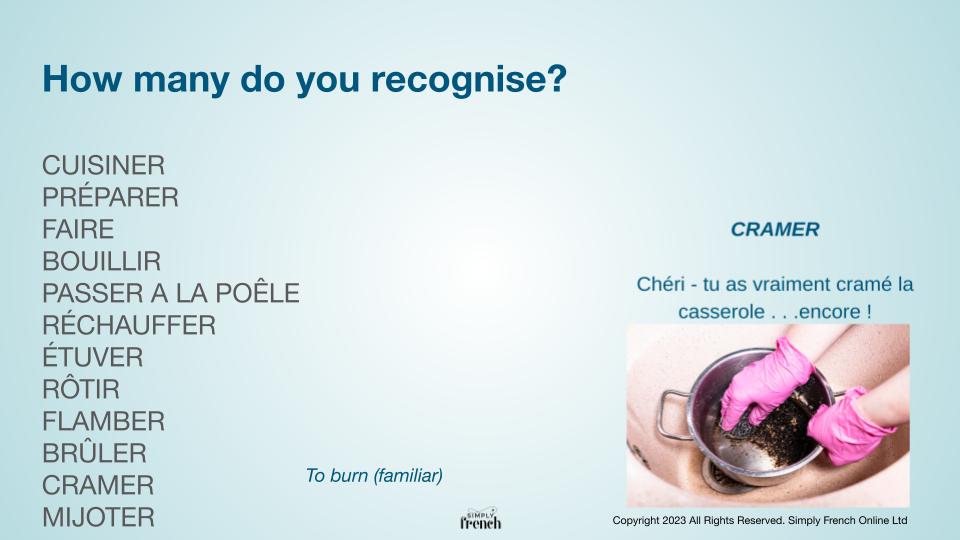
Learn how to say to simmer in French.
Finally, this French verb can be found in any traditional recipe. It entails a certain way to cool food items: to cook them for a certain period of time so that it’s almost boiling. So, the equivalent of simmer in French is mijoter.
- je mijote
- tu mijotes
- il / elle mijote
- nous mijotons
- vous mijotez
- ils / elles mijotent
In this context, you could say:
- Mijoter: ça veut dire cuire lentement à petit feu >>> To simmer: it means to cook slowly.
Note that verb mijoter also signifies to prepare something or to plot. Imagine someone who is thinking a lot, you could say:
- Ça mijote dans sa tête. >>> S/he is deep in their thought.
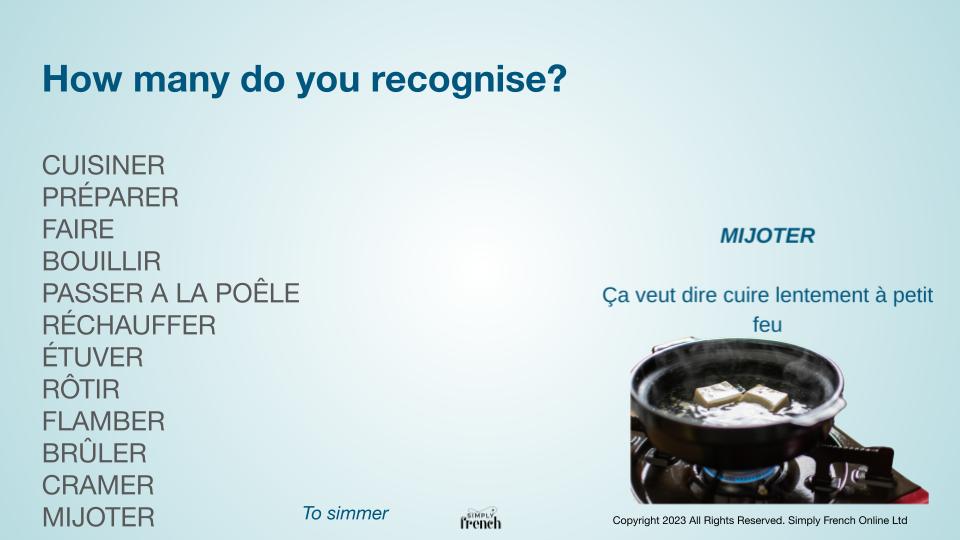
Some tips to memorise these French cooking verbs in a more effective way:
Oui! You have seen many words. The big question is: how are you going to memorise them (in a playful way)? Here are my tips for you:
- Pick the words you know you will use
- Put up a little list by the cooker
- Use the words in context each time you cook
- Change the tense (je…/ j’ai…/ je vais…)
- Use the list!
What about watching some short cooking videos to not only practise your verbs but also to discover delicious recipes? This website is number 1 in France.

So, now, you can’t stick to the verb cuire. Vary, play with the different verbs, and be specific! Next time you go to a French restaurant, read the descriptions of the dishes to recognise some verbs…By the way, what are your favourite French recipes? I would love to know!
Bon appétit!
Free Masterclass
Learn my 4 step method of how to hold meaningful french conversations the R.E.A.L. way in just 30 minutes a day.
When you signup, we'll be sending you weekly emails with additional free content

